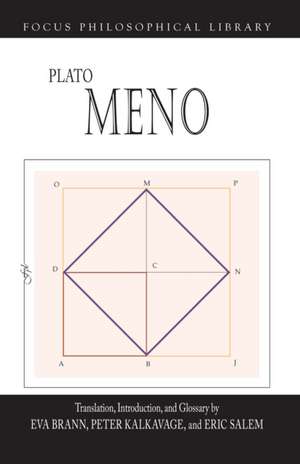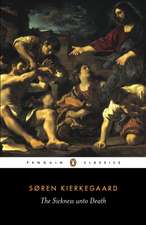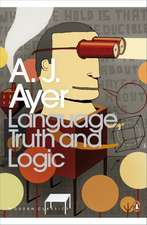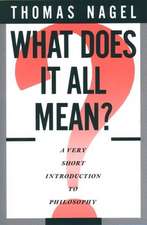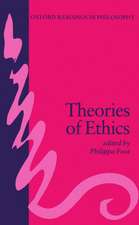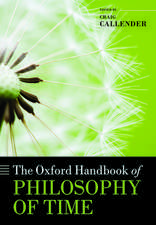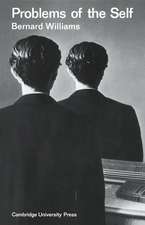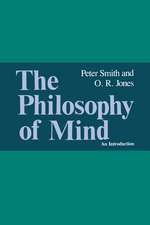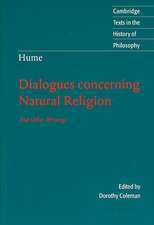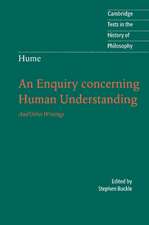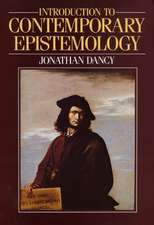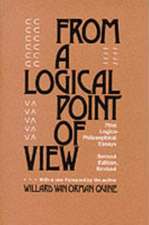Plato: Meno: Focus Philosophical Library
Autor Plato Traducere de Peter Kalkavage, Eric Salem, Eva Brannen Limba Engleză Paperback – 5 oct 2021
Din seria Focus Philosophical Library
-
 Preț: 157.47 lei
Preț: 157.47 lei -
 Preț: 85.01 lei
Preț: 85.01 lei - 8%
 Preț: 133.96 lei
Preț: 133.96 lei - 7%
 Preț: 95.09 lei
Preț: 95.09 lei - 9%
 Preț: 85.24 lei
Preț: 85.24 lei - 9%
 Preț: 84.77 lei
Preț: 84.77 lei - 8%
 Preț: 86.24 lei
Preț: 86.24 lei - 8%
 Preț: 87.22 lei
Preț: 87.22 lei - 8%
 Preț: 79.07 lei
Preț: 79.07 lei - 7%
 Preț: 141.58 lei
Preț: 141.58 lei - 8%
 Preț: 79.07 lei
Preț: 79.07 lei - 7%
 Preț: 136.27 lei
Preț: 136.27 lei - 8%
 Preț: 127.40 lei
Preț: 127.40 lei - 8%
 Preț: 92.60 lei
Preț: 92.60 lei - 14%
 Preț: 173.62 lei
Preț: 173.62 lei - 8%
 Preț: 98.71 lei
Preț: 98.71 lei - 9%
 Preț: 103.91 lei
Preț: 103.91 lei - 7%
 Preț: 137.21 lei
Preț: 137.21 lei - 8%
 Preț: 94.03 lei
Preț: 94.03 lei
Preț: 78.48 lei
Preț vechi: 85.92 lei
-9% Nou
Puncte Express: 118
Preț estimativ în valută:
15.02€ • 15.68$ • 12.40£
15.02€ • 15.68$ • 12.40£
Carte disponibilă
Livrare economică 25 martie-08 aprilie
Livrare express 08-14 martie pentru 21.80 lei
Preluare comenzi: 021 569.72.76
Specificații
ISBN-13: 9781585109937
ISBN-10: 1585109932
Pagini: 80
Ilustrații: 10 line diagrams
Dimensiuni: 9 x 215 x 139 mm
Greutate: 0.11 kg
Editura: Hackett Publishing Company
Colecția Hackett Publishing Company, Inc.
Seria Focus Philosophical Library
ISBN-10: 1585109932
Pagini: 80
Ilustrații: 10 line diagrams
Dimensiuni: 9 x 215 x 139 mm
Greutate: 0.11 kg
Editura: Hackett Publishing Company
Colecția Hackett Publishing Company, Inc.
Seria Focus Philosophical Library
Recenzii
"This trio from St. John's has produced the most high-fidelity English translation of the Meno available. The Introduction offers a no-nonsense summary of the dialogue, and ample footnotes alert the reader to important Greek terms, while also situating significant claims in their historical context as well as in the context of Plato's larger corpus. The Glossary helpfully places the focus on core philosophical concepts, and the Select Bibliography makes for a manageable introduction to some of the standard scholarship. This volume is an all-around success." Charles Ives, University of Washington
"This gem of a dialogue is elegantly rendered into English, masterfully achieving the twin goals of illuminating the Greek and speaking to a modern audience. In its fifth translation of a Platonic dialogue, the team of Brann, Kalkavage, and Salem is at the top of its craft, bringing alive this important Platonic dialogue in search of a definition of virtue." Stephen Scully, Boston University
"The translation stays close to the Greek while remaining clear and lively, allowing the reader to become absorbed in the drama without losing any of the provocative details of the original. The notes provide new and experienced readers with powerful tools for better appreciating both the task of the translator and the drama of the exchange between the characters. This is a first-rate volume for engaging each of the themes raised in the Meno while offering help pulling them all together. It is an excellent point of entry into Platonic dialogues and into philosophy generally, in fine Socratic spirit." Eric Sanday, University of Kentucky
"The appearance of a new translation of a Platonic dialogue by Eva Brann, Peter Kalkavage, and Eric Salem for the Focus Philosophical Library is always exciting, and this edition of the Meno does not disappoint. The translation is highly praiseworthy for its fidelity and lucidity, accurately capturing the vocabulary of the Greek while presenting the text in an engaging, colloquial form that places it among the best English translations of Plato. The book's value is increased by an authoritative but concise introductory overview of the dialogue, extensive historical and linguistic footnotes, and detailed geometric diagrams set directly within the text, rather than in an appendix. These virtues, along with its affordable cost, make this edition a must-have for scholars and an excellent choice for teaching at all levels." Colin C. Smith, Pennsylvania State University, in Bryn Mawr Classical Review
"As one would expect from the team of Brann, Kalkavage and Salem, their edition of Plato's Meno is a fine one. The translation meets their stated goal of remaining 'as faithful as possible to the Greek, while using lively, colloquial English.' Their notes are consistently helpful and will be particularly useful to those readers willing to explore the nuances of Plato's extraordinary prose. Their introduction is clear and compact, and it highlights the most philosophically important themes of the dialogue. One particularly useful feature of this edition is the manner in which it displays the diagrams Socrates draws in order to illustrate his famous 'square within a square.' Instead of relegating them to the notes, it integrates them into the text of the dialogue itself. Readers are able to follow along, and 'watch' Socrates actually construct them." David Roochnik, Boston University
"This gem of a dialogue is elegantly rendered into English, masterfully achieving the twin goals of illuminating the Greek and speaking to a modern audience. In its fifth translation of a Platonic dialogue, the team of Brann, Kalkavage, and Salem is at the top of its craft, bringing alive this important Platonic dialogue in search of a definition of virtue." Stephen Scully, Boston University
"The translation stays close to the Greek while remaining clear and lively, allowing the reader to become absorbed in the drama without losing any of the provocative details of the original. The notes provide new and experienced readers with powerful tools for better appreciating both the task of the translator and the drama of the exchange between the characters. This is a first-rate volume for engaging each of the themes raised in the Meno while offering help pulling them all together. It is an excellent point of entry into Platonic dialogues and into philosophy generally, in fine Socratic spirit." Eric Sanday, University of Kentucky
"The appearance of a new translation of a Platonic dialogue by Eva Brann, Peter Kalkavage, and Eric Salem for the Focus Philosophical Library is always exciting, and this edition of the Meno does not disappoint. The translation is highly praiseworthy for its fidelity and lucidity, accurately capturing the vocabulary of the Greek while presenting the text in an engaging, colloquial form that places it among the best English translations of Plato. The book's value is increased by an authoritative but concise introductory overview of the dialogue, extensive historical and linguistic footnotes, and detailed geometric diagrams set directly within the text, rather than in an appendix. These virtues, along with its affordable cost, make this edition a must-have for scholars and an excellent choice for teaching at all levels." Colin C. Smith, Pennsylvania State University, in Bryn Mawr Classical Review
"As one would expect from the team of Brann, Kalkavage and Salem, their edition of Plato's Meno is a fine one. The translation meets their stated goal of remaining 'as faithful as possible to the Greek, while using lively, colloquial English.' Their notes are consistently helpful and will be particularly useful to those readers willing to explore the nuances of Plato's extraordinary prose. Their introduction is clear and compact, and it highlights the most philosophically important themes of the dialogue. One particularly useful feature of this edition is the manner in which it displays the diagrams Socrates draws in order to illustrate his famous 'square within a square.' Instead of relegating them to the notes, it integrates them into the text of the dialogue itself. Readers are able to follow along, and 'watch' Socrates actually construct them." David Roochnik, Boston University
Descriere
Descriere de la o altă ediție sau format:
The second edition of Five Dialogues presents G. M. A. Grube's distinguished translations, as revised by John Cooper for Plato, Complete Works . A number of new or expanded footnotes are also included along with an updated bibliography.
Cuprins
Preface; Abbreviations; Introduction; Part I. Prolegomena to the Dialogue: 1. Introduction; 2. Summary and analysis of composition; 3. Is the Clitophon unfinished?; 4. The Clitophon as a Short Dialogue; 5. The characters of the dialogue; Part II. Meaning and Authenticity: 6. Philosophical protreptic in the fourth century BCE; 7. Protreptic in the Clitophon; 8. Protreptic in Plato; 9. Elenchos in the Clitophon; 10. Justice in the Clitophon; 11. The meaning of the Clitophon; 12. Date and authenticity; Text and translation; Commentary; Appendices: I. The ending of Aristotle's Protrepticus; II. Note on the text; Bibliography; Indexes.
Notă biografică
Plato was an ancient Greek philosopher born in Athens during the Classical period in Ancient Greece. In Athens, Plato founded the Academy, a philosophical school where he taught the philosophical doctrines that would later become known as Platonism. Plato (or Platon) was a pen name derived, apparently, from the nickname given to him by his wrestling coach - allegedly a reference to his physical broadness. According to Alexander of Miletus quoted by Diogenes of Sinope his actual name was Aristocles, son of Ariston, of the deme Collytus (Collytus being a district of Athens).[2]Plato was an innovator of the written dialogue and dialectic forms in philosophy. He raised problems for what later became all the major areas of both theoretical philosophy and practical philosophy. His most famous contribution is the Theory of forms, which has been interpreted as advancing a solution to what is now known as the problem of universals. He is also the namesake of Platonic love and the Platonic solids.His own most decisive philosophical influences are usually thought to have been, along with Socrates, the pre-Socratics Pythagoras, Heraclitus, and Parmenides, although few of his predecessors' works remain extant and much of what we know about these figures today derives from Plato himself.[a]Along with his teacher, Socrates, and his student, Aristotle, Plato is a central figure in the history of philosophy.[b] Unlike the work of nearly all of his contemporaries, Plato's entire body of work is believed to have survived intact for over 2,400 years.[6] Although their popularity has fluctuated, Plato's works have consistently been read and studied.[7] Through Neoplatonism Plato also greatly influenced both Christian and Islamic philosophy (through e.g. Al-Farabi). In modern times, Alfred North Whitehead famously said: "the safest general characterization of the European philosophical tradition is that it consists of a series of footnotes to Plato
Caracteristici
Concludes that justice, self-control (sophrosyne), and virtue (arete) are 'natural'; the city which displays them is most truly free; the individuals who possess them will achieve their true destiny.
